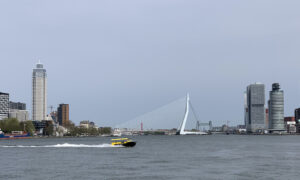The best entrepreneurs are always looking for opportunities in markets where industry leaders are most complacent and ossified.
Which explains why Europe suddenly is in the middle of a banking and financial transactions revolution, with a wave of new companies with mobile apps disrupting centuries-old banking bureaucracies.
“All these (European) markets have one thing in common,” Valentin Stalf, 30, co-founder of digital banking startup Number26 told the New York Times’ Bits blog recently. “They are some of the most-outdated banking markets in the world.”
 Number26, the Berlin-based New Wave bank backed by PayPal founder co-founder Peter Thiel and German media giant Axel Springer, is getting tremendous pub around the world.
Number26, the Berlin-based New Wave bank backed by PayPal founder co-founder Peter Thiel and German media giant Axel Springer, is getting tremendous pub around the world.
Earlier this month, Number26 execs announced they had expanded their mobile-only banking services from Germany and Austria into six European countries including France and Spain.
Number26 founders Stalf and Maximilian Tayenthal have said their goal is to create – in the mode of TransferWise – money without borders. Or in Number26’s case, banking without borders. To that end, the virtual bank has introduced an English version.
This is important for expats because of the ease of opening an account.
I’ve lived in several countries, including France, Germany and Turkey, and banking in each was far more rigid than dealing with American banks.
Take Germany, for example, which is home to dozens of mega-banks. The rules in Germany – shocker – are generally more stringent than those in the U.S. when it comes to fees, minimum balance requirements and how much money you’ll be required to deposit each month. To make things even tougher, non-Germans have to have a SCHUFA rating, the credit rating system used in Germany, or you can’t get credit cards, debit cards and overdraft protection.
Oh, and you have to register in Germany before you an do any of this.
 With Number26, you can open an account by snapping a pic of your passport, and the bank’s website states you can open an account in eight minutes. “You open a full-fledged NUMBER26 account with Wirecard Bank and receive all benefits and securities of a German bank account,” according to the website. And that account is fingerprint encrypted.
With Number26, you can open an account by snapping a pic of your passport, and the bank’s website states you can open an account in eight minutes. “You open a full-fledged NUMBER26 account with Wirecard Bank and receive all benefits and securities of a German bank account,” according to the website. And that account is fingerprint encrypted.
Number26 uses push notifications to alert customers when transactions are complete. Other perks include free cash withdrawals anywhere in the world and a network of retailers – so far, only in Germany – that allow Number26 account holders to withdraw and deposit cash in-store. (As you probably guessed, E.U. regulators require Number26 to create a conventional bank to hold deposits.)
Number26 is just one financial-sector startup that’s challenging the Old Order.
BBVA, the Spanish bank, made big news in the financial press earlier this year when it reversed the Trans-Atlantic trend, buying Simple, an American banking startup, for $177 million, mainly to acquire Simple’s sophisticated banking apps.
Recently, BBVA bought a one-third stake in mobile-only London-based Atom Bank, a stake that values the startup at $228 million. BBVA’s Spanish rival Santandar Bank recently announced it’s creating a fintech investment fund that would have $100 million to invest in the best technology around the world.
 A few weeks ago, we wrote about TransferWise and how the London-based startup helped us personally avoid almost $200 in fees at our American bank to pay two parking fines in the Netherlands totaling only $142.
A few weeks ago, we wrote about TransferWise and how the London-based startup helped us personally avoid almost $200 in fees at our American bank to pay two parking fines in the Netherlands totaling only $142.
TransferWise bypasses banks by essentially doing digital peer-to-peer currency matchups in a model not so different from Airbnb.
Already, this whole bank/financial services trend shows signs of accelerating. Adyen, the Amsterdam-based Unicorn, ultimately aspires to own all transactions – mobile, online and in-store – all over the world.
Now, we see two possible outcomes for all this digital drama. The Old Order will respond by nudging regulators to create obstacles for digital-only banks in the name of counter-terrorism.
More likely, though, is U.S.-based tech sharks such as Amazon will realize how fun it would be to acquire their own digital financial systems, and will simply come in and and snap up the tastiest morsels like so many minnows.
When Marx wrote that capitalism recreates the world in its own image, this must be what he meant.
We’ll have more country-by-country posts about the practical end of choosing a bank in Europe.
Co-CEO of Dispatches Europe. A former military reporter, I'm a serial expat who has lived in France, Turkey, Germany and the Netherlands.















